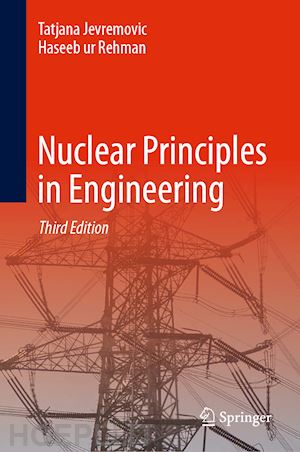
Questo prodotto usufruisce delle SPEDIZIONI GRATIS
selezionando l'opzione Corriere Veloce in fase di ordine.
Pagabile anche con Carta della cultura giovani e del merito, 18App Bonus Cultura e Carta del Docente
Several emerging application areas are driving a revival in nuclear engineering, including new nuclear reactor designs (advanced water-cooled reactors, small modular reactors, and microreactors) and their various applications beyond electricity production and a revolution in nuclear medicine, nuclear space exploration, hydrogen production, and homeland security. This fully updated introductory textbook provides students and practitioners with the fundamentals of nuclear principles in engineering for a thorough understanding of physical processes relating to neutron physics, nuclear structures, and radiation interactions. To comprehend physical phenomena, hands-on computational exercises supported by mathematical details and real-life examples are provided to communicate the nuclear principles concepts. A new chapter details the evolution of nuclear power plants, explaining the modern-day technologies based on design details linked to the basic principles of nuclear engineering. In addition, every chapter is supplied with the problems solutions and answers.
Nuclear Principles in Engineering, Third Edition, is written for students, engineers, physicists, and scientists who need up-to-date information on basic nuclear concepts and calculation methods, and will serve as an invaluable resource for training programs in the nuclear sector.
Nuclear Concepts.- Atomic Theory.- Nuclear Theory.- Duality of Nature.- Radioactive Decay.- Interactions of Radiation with Matter.- Neutron Physics.- Neutron Transport.- Solution Methodologies of Neutron Transport.- Nuclear Reactor Control.
Dr. Tatjana Jevremovic, is a Senior Manager in Nuclear Technology & Regulations at Sargent & Lundy Company in the USA. Prior to this role, she served as A/Section Head and Team Leader for Water Cooled Reactor Technology Development in the Nuclear Power Technology Development Section at the International Atomic Energy Agency (IAEA). Dr. Jevremovic also chaired the Technical Selection Committee of the IAEA’s Marie Curie-Sklodowska Fellowship Programme (MSCFP), which aims to encourage women to pursue graduate-level nuclear-related studies. Additionally, she was the Technical Lead of the IAEA Lise Meitner Program, focused on advancing and retaining female experts in nuclear-related fields globally. Prior to her current roles, Dr. Jevremovic spent 11 years in Japan, where she first earned her Ph.D. in Nuclear Engineering from the University of Tokyo. She then served as a professor at the University of Tokyo before becoming Chief Engineer at Nuclear Fuel Industries, Ltd. During her time there, she developed a novel methodology for nuclear reactor physics assessments, which is still used today for the relicensing of nuclear power plants in Japan. Later, she relocated to the USA, where she held the prestigious position of Chair Professor at the University of Utah. She also led the Nuclear Engineering Program and served as Director of the university's research reactor. Dr. Jevremovic has published over 200 papers in journals and conferences, has graduated over 40 students who all hold responsible positions in the nuclear sector worldwide, and she serves on numerous national and international committees.
Dr. Haseeb ur Rehman, is an expert in the Nuclear Power Technology Development Section at the International Atomic Energy Agency (IAEA). He also holds a full-time faculty position as an Associate Professor in the Department of Nuclear Engineering at Pakistan Institute of Engineering and Applied Sciences (PIEAS). With over a decade of experience in teaching, research, and development, his expertise lies in nuclear power technology, particularly in nuclear reactor design and simulation. Dr. Rehman possesses a deep understanding of global nuclear power development and deployment, as well as emerging future technologies in the field. He earned his Ph.D. in Nuclear and Quantum Engineering from Korea Advanced Institute of Science and Technology (KAIST), Republic of Korea, where his research focused on innovative hybrid photon and neutron transmutation methods. Additionally, he has contributed to numerous journal and conference publications across diverse areas of nuclear engineering.











Il sito utilizza cookie ed altri strumenti di tracciamento che raccolgono informazioni dal dispositivo dell’utente. Oltre ai cookie tecnici ed analitici aggregati, strettamente necessari per il funzionamento di questo sito web, previo consenso dell’utente possono essere installati cookie di profilazione e marketing e cookie dei social media. Cliccando su “Accetto tutti i cookie” saranno attivate tutte le categorie di cookie. Per accettare solo deterninate categorie di cookie, cliccare invece su “Impostazioni cookie”. Chiudendo il banner o continuando a navigare saranno installati solo cookie tecnici. Per maggiori dettagli, consultare la Cookie Policy.